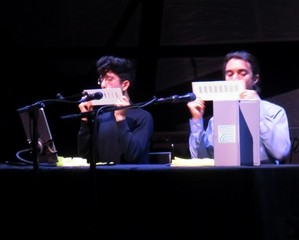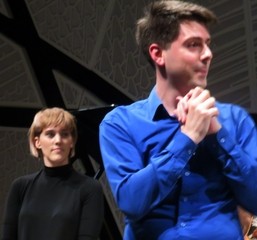|
Back
Breathless...Breathtaking... New York
National Sawdust
06/02/2018 -
Philippe Leroux: Voi(REX)
Jukka Tiensuu: Plus IV
Mauricio Kagel: Unguis incarnatus est
Simon Steen-Andersen: Difficulties Putting it into Practice
Guillaume de Machaut: From Le Lai de Bonne Esperance
Lucy Dhegrae (Voice)
Rosie Gallagher (Flute, Piccolo), Yuri Namkung (Violin), Madeline Fayette (Cello), Cantata Profana Core Artists: Gleb Kanasevich (Clarinet, Bass Clarinet), Doug Perry (Percussion), Lee Dionne (Piano), Daniel Schlosberg (Piano, Keyboard), Jacob Ashworth (Conductor)

L. Dionne, D. Perry (© Samuel A. Dog)
“And Music is an art which likes people to laugh and sing and dance. It cares nothing for melancholy, nor for a man who sorrows over what is of no importance. It brings joy everywhere it's present; it comforts the disconsolate, and just hearing it makes people rejoice.”
Guillaume de Machaut (1300-1377) Translated from the French
What a befitting quote from the great 14th Century poet/composer, who highlighted last night’s final seasonal concert of Cantata Profana at National Sawdust.
Those expecting “experimental” music (as one listener mentioned to me) heard no experiments. All five composers knew what they wanted. Which was, in Machaut’s words, laughter and singing and almost-dance.
And those expecting atonal Wuorinen-style atonality found themselves happily locked in a euphonious candy store. Not store-bought candies, but note-worthy hand-composed Bruges-created chocolate.
The five composers here understood the joy of music-making. And Cantata Profana–with their guests–are probably the most technically proficient musicians around New York. For while this music was joyous, much of it depended on quark-slivered counterpoint, quarter-toned delicacy and–in one case–uninstrumental instruments.
This was Difficulties Putting it into Practice, performed (if that be the word) by Lee Dionne and Doug Perry, Sitting at a table together, with contact microphones, they blew notes into cardboard cutouts, they played with paper, they whispered and wheezed, they made jews-harp sounds with their cheeks, they “argued” and “conversed” quite happily in their sound-piece incarnate.
Then again, the composer was Simon Steen-Andersen, who, when last I heard him at Columbia University, had burdened the JACK String Quartet with bows shackled by rubber bands, with weights on their arms, and white noise distracting them in their headphones. Next to this, the lingua-glossa sounds of Messrs Dionne and Perry were child’s play.
Child’s play started the concert with Mauricio Kagel’s Unguis incarnatus est. Kagel, like Ligeti, had two faces. He could be a serious serial composer when needed. But more often in his last years, he was a droll serial-killer of music. His compositions became stage works with screaming, yelling, dancing and whistles. Yet his film on Beethoven was a beautiful as anything ever written.
This work was conservative enough, consisting of pianist Dionne and...and...well the score cover calls for “Piano And ??”, so any instrument will do. Here it was the offstage (rather, standing to the side of the audience) cellist Madeline Fayette. While the pianist was playing simply, punctuating the music with very vocal pedals, she became the ghost of music, sometimes spectrally behind the piano, frequently soaring above the piano. Even with only two instruments, it was Kagel, the man of the theater.
Following this were excerpts from a long Guillaume de Machaut strophic poem, sung by Lucy Dhegrae. Ms. Dhegrae’s genius would be shown in the final work. Here, her dark expressive voice was solo, sung in near-darkness It was atmospheric and lovely in its own way. But the composer might have doubted this was “Machaut-business” as he envisioned it. Solo singing was ars antiqua, and he was a nova man. He needed more voices or vielle or rebecs or even portable organs. Singing alone in the shadows was atmospheric. It hardly represented Machaut, the zesty, ebullient cynosure of the 14th Century.
Never mind that. In this jewel-shop (the candy-store doesn’t fit) came a quartet of rope-walking dazzlement. A dazzling mélange of clarinet, piano, synthesizer (a replacement for the original accordion) and cello which quivered and hemidemisemi-quavered with such precision, such note-sharp millisecond, quarter-tone exactitude that I was left frankly dizzy.
Then again, Finnish composer Jukka Tiens, a worthy heir to the burgeoning post-post Sibelius tradition, here joins Plus IV to other pieces which demanded the greatest technical accuracy. This work, like others on the program, gave us of an insoluable puzzle. Who was in charge? How did Madeline Fayette’s spot-on cello suddenly get ahead of Gleb Kanasevich’s palpitating clarinet? Where was it leading?
And in such a dog-chase-cat-chase-parakeet-chase-squirrel, where was it all leading? I personally didn’t care. The insanity of the pursuit was its own reward.

L. Dhegrae, J. Ashworth (© Samuel A. Dog)
By far the longest and most intricate work, conducted by Cantata Profana Artistic Director Jacob Ashworth, was Voi(REX), by the Paris-born, Montreal-based Philippe Leroux. His study with Pierre Schaeffer showed not only in the expert economy of sounds from the eight-voiced ensemble, but in emotionally sinewy work of soprano Lucy Dhegrae.
In the previous Machaut, she produced feelings, but they were restrained. Here, she took the words of poet Lin Delpierre, twisting them with tonal legerdemain (yes, the usual soars from top to bottom, tools of every soprano singing today), but with vocal qualities which ranged from bleak despair to mad bel canto phrasing.
This was not, though, the playful work of the previous works. Mr. Leroux, as far as I could hear, had a multi-voiced reverberation. First, Ms. Dhegrae’s mouth-miked voice, then a computer used to imitate her voice, give silhouettes, echoes at times. But then, most importantly, the composer didn’t allow an electronic tool to take over. Percussionist Doug Perry used gongs, tom-toms, vibraphone, soft drums, clarinet, cello and violin accompanied her, giving the voice even more voices until the very cryptic end...when Ms. Dhegrae wrote...on...the...air.
And after this finale to the sixth season of Cantata Profana at National Sawdust, we poor mortals will simply have to wait for September 14, when they again open their breathless (and like their clarinetist, breathtaking) musical jewelry-shop.
Harry Rolnick
|